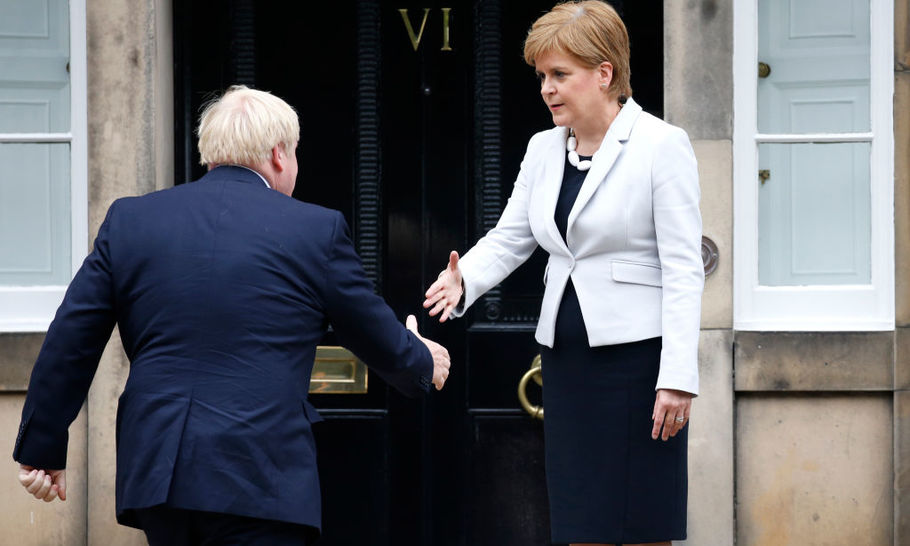Will Boris Johnson be remembered as the first Prime Minister of England?

Duncan McGlynn/Getty Images
Public consciousness is a cruel historian. Several of our prime ministers, no matter the length and breadth of their careers, found themselves defined by one word alone. For Eden it was Suez, for Chamberlain appeasement. It scarcely mattered that Eden was a highly effective Foreign Secretary for most of the Second World War, nor that Chamberlain was responsible for one of the most ambitious house-building programmes in British history. Theresa May will be lucky if future generations remember anything about her other than Brexit. Our new Prime Minister will have to work hard to ensure he in turn isn’t recalled by a single word, in his case Scotland.
Boris has long had a Scottish problem. Something about his bumbling Bertie Wooster impersonation seems to lose its charm when you head north of Carlisle. A Panelbase poll published last month gave him an approval rating of minus 37 in the country. The average woodworm infestation is treated with more respect than Ruth Davidson, the Scottish Conservative leader, has bestowed upon her now leader. Having done more than anyone else to turn the Scottish Tories from a punchline into a credible political force, Davidson clearly fears for her legacy. She shouldn’t be the only one.
The Panelbase poll contained even more incendiary, and troubling, results. In the event of a no deal Brexit, 59 per cent said independence would be in the best interests of Scotland, versus just 41 per cent for remaining in the UK. In these circumstances 52 per cent said they would vote to leave the union, versus 48 per cent for staying in. In the absence of a no deal Brexit, remaining in the UK records a slight majority.
Already we are hearing warnings. Gordon Brown, one of the key figures behind the survival of the union during the 2014 referendum, said Boris risks becoming the “first Prime Minister of England”. This points to an obvious truth. It’s not just in Scotland, but Northern Ireland as well, that the union is under pressure. Among those who welcomed Boris’s triumph was Raymond McCartney, a former IRA terrorist turned Sinn Fein representative on the Northern Ireland Assembly. Taking to Twitter he remarked “Boris, one small step for Tory unity, a giant leap towards Irish unity!”. In February the BBC was briefed by a senior minister that Northern Ireland could be “sleepwalking into a border poll”.
Boris can reasonably be termed many things, but a fool is not one of them. He is acutely aware of the threat to the union, and must know it could define his legacy. On Monday he visited Scotland vowing to “work tirelessly to strengthen the United Kingdom”. He has appointed himself ‘Minister for the Union’ and taken to describing the United Kingdom, with characteristic literary flair, as the ‘Awesome Foursome’. It is far from clear, alas, that this will be enough to dilute the reaction to a no-deal Brexit.
What’s particularly troubling, for the long term, is the relative ambivalence about the union displayed by a sizeable section of the Conservative Party membership. An extraordinary YouGov poll published in June found 63 per cent would accept Scotland leaving the British union as the price for Brexit, along with 59 per cent for Northern Ireland.
Britain’s survival as a political union has become, for a significant number of English Tories, an optional extra. If we continue much further down this road, the Liberal Democrats will become the most reliably unionist party. There’s something grimly ironic about wrapping yourself tightly in the Union Jack when you’re prepared to see the destruction of the country it represents. British nationalism could be the first political movement in the modern era to find itself qualifying for a Darwin Award.
It is hard to overstate how dramatic the loss of Scotland would be to the UK’s global standing. At a stroke the country would forfeit 32 per cent of its territory and 8 per cent of its population. But I fear even these figures downplay the level of loss. The British brand is, for various historic and cultural reasons, enormously powerful, from Seoul to Seattle. It simply cannot be replicated by some kind of Anglo-Welsh union. Inevitably other powers, most obviously the likes of India, Germany and Japan, would ask if the remainder of the UK deserves to hold on to its permanent seat on the UN Security Council. We would also have a national debate about what to do about our nuclear weapons, currently based in Scotland, at a time when the Labour leader would like to see them abandoned.
The United Kingdom has, by just about any measure I can draw to mind, been a phenomenally successful political entity. For over 300 years it has provided its people with internal stability, external security and relative prosperity, during times when many of its neighbours could only dream of such things. To throw it away would be an extraordinary act of vandalism. The British union has survived the worst machinations of its enemies for generations. The likes of Napoleon Bonaparte, Kaiser Wilhelm and Adolf Hitler have tried and failed to break it. Alas it remains to be seen whether, having fought off its foes, the United Kingdom ends up being dismantled by those who claim to love it most.





